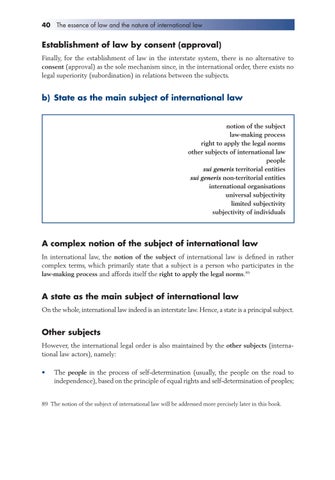40 The essence of law and the nature of international law
Establishment of law by consent (approval) Finally, for the establishment of law in the interstate system, there is no alternative to consent (approval) as the sole mechanism since, in the international order, there exists no legal superiority (subordination) in relations between the subjects.
b) State as the main subject of international law
notion of the subject law-making process right to apply the legal norms other subjects of international law people sui generis territorial entities sui generis non-territorial entities international organisations universal subjectivity limited subjectivity subjectivity of individuals
A complex notion of the subject of international law In international law, the notion of the subject of international law is defned in rather complex terms, which primarily state that a subject is a person who participates in the law-making process and affords itself the right to apply the legal norms.89
A state as the main subject of international law On the whole, international law indeed is an interstate law. Hence, a state is a principal subject.
Other subjects However, the international legal order is also maintained by the other subjects (international law actors), namely: •
The people in the process of self-determination (usually, the people on the road to independence), based on the principle of equal rights and self-determination of peoples;
89 The notion of the subject of international law will be addressed more precisely later in this book.

